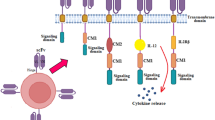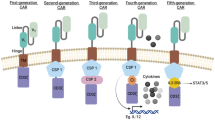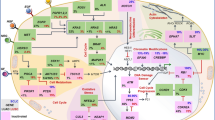Abstract
Recently, chimeric antigen receptor T cell (CAR-T) therapy has received increasing attention as an adoptive cellular immunotherapy that targets tumors. However, numerous challenges remain for the effective use of CAR-T to treat solid tumors, including ovarian cancer, which is an aggressive and metastatic cancer with a poor therapeutic response. We screened for an effective anti-MSLN single-chain Fv antibody with comparable binding activity and non-off-target properties using human phage display library. A second-generation of anti-MSLN CAR was designed and generated. We demonstrated the efficacy of our anti-MSLN CAR-T cells for ovarian cancer treatment in an in vitro experiment to kill ovarian tumor cell lines. The anti-MSLN CAR-T cells impeded MSLN-positive tumor growth concomitant with a significant increase in cytokine levels compared with the control. Then, we demonstrated the efficacy of anti-MSLN CAR-T cells in an in vivo experiment against ovarian cancer cell-derived xenografts. Furthermore, we herein report three cases with ovarian cancer who were treated with autologous anti-MSLN CAR-T cells and evaluate the safety and effectiveness of adoptive cell therapy. In this investigator-initiated clinical trials, no patients experienced cytokine release syndrome or neurological symptoms over 2 grads. Disease stabilized in two patients, with progression-free survival times of 5.8 and 4.6 months. Transient CAR expression was detected in patient blood after infusion each time. The tumor partially subsided, and the patient’s condition was relieved. In conclusion, this work proves the efficacy of the anti-MSLN CAR-T treatment strategy in ovarian cancer and provides preliminary data for the development of further clinical trials.






Similar content being viewed by others
Data availability
The authors declare that all data supporting the results in this study are available within the paper and its supplementary information. Source data for the figures in this study are available from the corresponding author upon reasonable request.
Change history
14 August 2023
A Correction to this paper has been published: https://doi.org/10.1007/s00262-023-03510-7
Abbreviations
- CDX:
-
Cell-derived xenografts
- CRS:
-
Cytokine release syndrome
- CT:
-
Computed tomography
- DLT:
-
Dose-limiting toxicity
- ELISA:
-
Enzyme-linked immunosorbent assay
- FDA:
-
Food and Drug Administration
- H&E:
-
Hematoxylin and eosin
- IARC:
-
International Agency for Research on Cancer
- NSCLC:
-
Non-small cell lung cancer
- PBMC:
-
Peripheral blood mononuclear cells
- PET:
-
Positron emission tomography
- PR:
-
Partial response
- SD:
-
Stable disease
- WBC:
-
White blood cell
References
Siegel RL, Miller KD, Fuchs HE, Jemal A (2021) Cancer statistics, 2021. CA: A Cancer J Clin 71:7–33. https://doi.org/10.3322/caac.21654
Sung H, Ferlay J, Siegel RL, Laversanne M, Soerjomataram I, Jemal A, Bray F (2021) Global cancer statistics 2020: globocan estimates of incidence and mortality worldwide for 36 cancers in 185 countries. CA: A Cancer J Clin 71:209–49. https://doi.org/10.3322/caac.21660
Matulonis UA, Sood AK, Fallowfield L, Howitt BE, Sehouli J, Karlan BY (2016) Ovarian cancer. Nat Rev Dis Primers 2:16061. https://doi.org/10.1038/nrdp.2016.61
Tyagi K, Mandal S, Roy A (2021) Recent advancements in therapeutic targeting of the warburg effect in refractory ovarian cancer: a promise towards disease remission. Biochim et Biophys Acta (BBA) - Rev on Cancer 1876(1):188563. https://doi.org/10.1016/j.bbcan.2021.188563
Lheureux S, Gourley C, Vergote I, Oza AM (2019) Epithelial ovarian cancer. The Lancet 393:1240–1253. https://doi.org/10.1016/S0140-6736(18)32552-2
Jiang C, Gang W, Hai C et al (2018) Potent anti-leukemia activities of humanized cd19-targeted chimeric antigen receptor t (car-t) cells in patients with relapsed/refractory acute lymphoblastic leukemia. Am J Hematol 93:851–858. https://doi.org/10.1002/ajh.25108
Upadhaya S, Yu XA, Shah M, Correa D, Campbell JR (2021) The clinical pipeline for cancer cell therapies. Nat Rev Drug Discov 20(7):503–504. https://doi.org/10.1038/d41573-021-00100-z
Choi T, Kang Y (2021) Chimeric antigen receptor (car) t-cell therapy for multiple myeloma. Pharmacol Therapeut. https://doi.org/10.1016/j.pharmthera.2021.108007
Ji F, Zhang F, Zhang M et al (2021) Targeting the dna damage response enhances cd70 car-t cell therapy for renal carcinoma by activating the cgas-sting pathway. J Hematol Oncol 14:152. https://doi.org/10.1186/s13045-021-01168-1
Tian Y, Li Y, Shao Y, Zhang Y (2020) Gene modification strategies for next-generation car t cells against solid cancers. J Hematol Oncol. https://doi.org/10.1186/s13045-020-00890-6
Andrea AE, Chiron A, Bessoles S, Hacein-Bey-Abina S (2020) Engineering next-generation car-t cells for better toxicity management. Int J Mol Sci 21:8620. https://doi.org/10.3390/ijms21228620
Cappell KM, Kochenderfer JN (2021) A comparison of chimeric antigen receptors containing cd28 versus 4–1bb costimulatory domains. Nat Rev Clin Oncol 18:715–727. https://doi.org/10.1038/s41571-021-00530-z
Mullard A (2017) Fda approves first car t therapy. Nat Rev Drug Discov 16:669. https://doi.org/10.1038/nrd.2017.196
Crees ZD, Ghobadi A (2021) Cellular therapy updates in b-cell lymphoma: the state of the car-t. Cancers 13:5181. https://doi.org/10.3390/cancers13205181
Neelapu SS, Jacobson CA, Oluwole OO et al (2020) Outcomes of older patients in zuma-1, a pivotal study of axicabtagene ciloleucel in refractory large b-cell lymphoma. Blood 135:2106–2109. https://doi.org/10.1182/blood.2019004162
Schoutrop E, El-Serafi I, Poiret T et al (2021) Mesothelin-specific car t cells target ovarian cancer. Cancer Res 81:3022–3035. https://doi.org/10.1158/0008-5472.CAN-20-2701
Zhang Q, Liu G, Liu J et al (2021) The antitumor capacity of mesothelin-car-t cells in targeting solid tumors in mice. Mol Ther - Oncolytics 20:556–568. https://doi.org/10.1016/j.omto.2021.02.013
Lv J, Li P (2019) Mesothelin as a biomarker for targeted therapy. Biomark Res. https://doi.org/10.1186/s40364-019-0169-8
Hassan R, Thomas A, Alewine C, Le DT, Jaffee EM, Pastan I (2016) Mesothelin immunotherapy for cancer: ready for prime time? J Clin Oncol 34:4171–4179. https://doi.org/10.1200/JCO.2016.68.3672
Beatty GL, Hara O, M H, Lacey S F, et al (2018) Activity of mesothelin-specific chimeric antigen receptor t cells against pancreatic carcinoma metastases in a phase 1 trial. Gastroenterology 155:29–32. https://doi.org/10.1053/j.gastro.2018.03.029
Zhao R, Cui Y, Zheng Y et al (2021) Human hyaluronidase ph20 potentiates the antitumor activities of mesothelin-specific car-t cells against gastric cancer. Front Immunol 12:660488. https://doi.org/10.3389/fimmu.2021.660488
Klampatsa A, Dimou V, Albelda SM (2021) Mesothelin-targeted car-t cell therapy for solid tumors. Expert Opin Biol Th 21:473–486. https://doi.org/10.1080/14712598.2021.1843628
Molloy ME, Austin RJ, Lemon BD et al (2021) Preclinical characterization of hpn536, a trispecific, t-cell–activating protein construct for the treatment of mesothelin-expressing solid tumors. Clin Cancer Res 27:1452–1462. https://doi.org/10.1158/1078-0432.CCR-20-3392
Wu S, Wang J, Sun J, He Z, Zhang W, Zhou J (2019) Real-world impact of survival by period of diagnosis in epithelial ovarian cancer between 1990 and 2014. Front Oncol 9:639. https://doi.org/10.3389/fonc.2019.00639
Atallah GA, Abd.Aziz NH, Teik CK, Shafiee MN, Kampan NC (2021) New predictive biomarkers for ovarian cancer. Diagnostics 11:465. https://doi.org/10.3390/diagnostics11030465
Wang Z, Guo Y, Han W (2017) Current status and perspectives of chimeric antigen receptor modified t cells for cancer treatment. Protein Cell 8:896–925. https://doi.org/10.1007/s13238-017-0400-z
Podar K, Leleu X (2021) Relapsed/refractory multiple myeloma in 2020/2021 and beyond. Cancers 13:5154. https://doi.org/10.3390/cancers13205154
Rodriguez-Garcia A, Sharma P, Poussin M et al (2020) Car t cells targeting misiir for the treatment of ovarian cancer and other gynecologic malignancies. Mol Ther 28:548–560. https://doi.org/10.1016/j.ymthe.2019.11.028
Morello A, Sadelain M, Adusumilli PS (2016) Mesothelin-targeted cars: driving t cells to solid tumors. Cancer Discov 6:133–146. https://doi.org/10.1158/2159-8290.CD-15-0583
Sterner RC, Sterner RM (2021) Car-t cell therapy: current limitations and potential strategies. Blood Cancer J 11:69. https://doi.org/10.1038/s41408-021-00459-7
Li W, Song X, Jin Y, Li F, Yu H, Cao C, Jiang Q (2017) Carts for solid tumors: feasible or infeasible? Oncol Res Treat 40:540–546. https://doi.org/10.1159/000477095
DeRenzo C, Gottschalk S (2019) Genetic modification strategies to enhance car t cell persistence for patients with solid tumors. Front Immunol 10:218. https://doi.org/10.3389/fimmu.2019.00218
Berger C, Flowers ME, Warren EH, Riddell SR (2006) Analysis of transgene-specific immune responses that limit the in vivo persistence of adoptively transferred hsv-tk–modified donor t cells after allogeneic hematopoietic cell transplantation. Blood 107:2294–2302. https://doi.org/10.1182/blood-2005-08-3503
Krishna M, Nadler SG (2016) Immunogenicity to biotherapeutics – the role of anti-drug immune complexes. Front Immunol 7:21. https://doi.org/10.3389/fimmu.2016.00021
Ml O, Erv M, Sv R, Jd B, Ap R, Al W, Da TL (2022) Low-affinity car t cells exhibit reduced trogocytosis, preventing rapid antigen loss, and increasing car t cell expansion. Leukemia. https://doi.org/10.1038/s41375-022-01585-2
Fang J, Sun Y, Guo X et al (2020) Safety and efficacy of chimeric antigen receptor t cells modified to target mesothelin and express pd-1 antibodies in patients with relapsed/refractory solid cancers in a phase i trial. J Clin Oncol 38:3039. https://doi.org/10.1200/JCO.2020.38.15_suppl.3039
Haas AR, Tanyi JL, O’Hara MH et al (2019) Phase i study of lentiviral-transduced chimeric antigen receptor-modified t cells recognizing mesothelin in advanced solid cancers. Mol Ther 27:1919–29. https://doi.org/10.1016/j.ymthe.2019.07.015
Acknowledgements
This study was supported by the National Natural Science Foundation of China (81872284) and the Priority Academic Program Development of Jiangsu Higher Education Institutions. We thank every member of the laboratory, as well as the patients and their families, and Nanjing Blue Shield Co. Thanks also to Junfeng Zhang, Liang Jing and Yaoyao Zhao from Nanjing Blue Shield Co. for technical support.
Author information
Authors and Affiliations
Contributions
JC, ZG and ZH contributed to the conception and design; JC, JH, LG, FJ, JL, ZC, LJ, YZ2, RS, LM, SJ, YZ4, QZ, JL and SY contributed to the acquisition of data; JC, JH, FJ, LJ, JL, MZ and FZ contributed to the analysis and interpretation of data; JC, LG and FJ contributed to the writing, review, and/or revision of the manuscript; JH, LJ, RS, LM, YZ2, SJ, YZ4, QZ, JL and SY collected the data of clinical characteristics; JC, JH, YZ, LJ, LG, FJ, JL, SJ, YZ, QZ, SY, ZG and ZH contributed to the administrative, technical, or material support; ZG and ZH supervised the study.
Corresponding authors
Ethics declarations
Conflict of interest
The authors declare no conflict of interests.
Ethical approval and consent to participate
All in vivo animal experiments were approved by the Committee on the Ethics of Animal Experiments of Nanjing Normal University (IRB#2020–0047). The clinical experiment was approved by the Experimental Ethics Committee of the Eastern Theater General Hospital (formerly the 81st Hospital of the People's Liberation Army) (81YY-KYLL-04–25-02).
Additional information
Publisher's Note
Springer Nature remains neutral with regard to jurisdictional claims in published maps and institutional affiliations.
Supplementary Information
Below is the link to the electronic supplementary material.
Rights and permissions
Springer Nature or its licensor (e.g. a society or other partner) holds exclusive rights to this article under a publishing agreement with the author(s) or other rightsholder(s); author self-archiving of the accepted manuscript version of this article is solely governed by the terms of such publishing agreement and applicable law.
About this article
Cite this article
Chen, J., Hu, J., Gu, L. et al. Anti-mesothelin CAR-T immunotherapy in patients with ovarian cancer. Cancer Immunol Immunother 72, 409–425 (2023). https://doi.org/10.1007/s00262-022-03238-w
Received:
Accepted:
Published:
Issue Date:
DOI: https://doi.org/10.1007/s00262-022-03238-w




